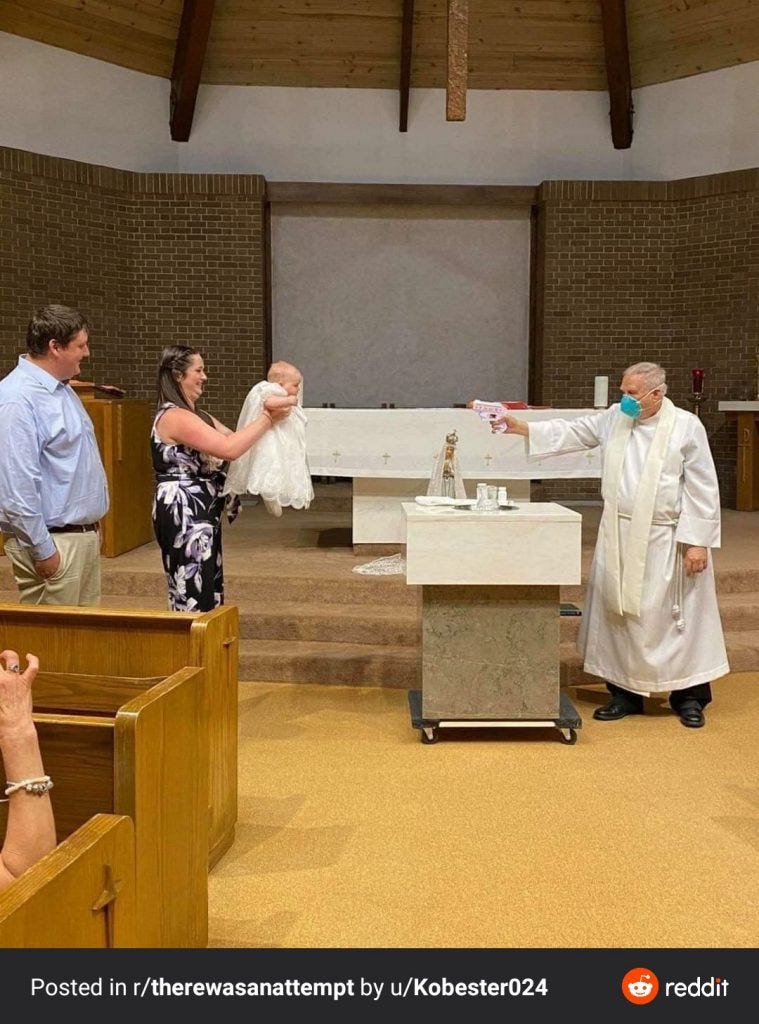I Desire Mercy, Not Sacrifice
I love this picture. Zoom in on the water gun and check out the details. It’s hilarious. It really makes you wonder what that baby is thinking... or what the adults were thinking for that matter.
Now, before we get distracted by original sin, infant baptism, etc., let me make my point:
1 At that time Jesus went through the grainfields on the Sabbath, and His disciples became hungry and began to pick the heads of grain and eat.
2 But when the Pharisees saw this, they said to Him, “Look, Your disciples do what is not lawful [read: Scriptural] to do on a Sabbath.”
3 But He said to them, “Have you not read what David did when he became hungry, he and his companions,
4 how he entered the house of God, and they ate the consecrated bread, which was not lawful for him to eat nor for those with him, but for the priests alone?
5 “Or have you not read in the Law, that on the Sabbath the priests in the temple break the Sabbath and are innocent?
6 “But I say to you that something greater than the temple is here.
7 “But if you had known what this means, ‘I desire compassion, and not a sacrifice,’ you would not have condemned the innocent.
Matthew 12:1-7
The Pharisees were upset with Jesus’s disciples because they were not doing something that was technically scriptural/ lawful. But Jesus’s main point is that mercy triumphs over sacrifice. In other words, there are times when it is more important to take care of a need than it is to be “scriptural” in the strictest sense. In that way, we would be doing exactly what God wanted us to do.
Back to the picture.
Does God need sacrifice? Does God need ceremony? According to the book of Psalms, He doesn’t. Humans need those things in one way or another but God doesn’t.
Sometimes, however, in attempting to be “scriptural,” we miss the spirit of the law which is what Jesus is talking about.
Man was not made for the Sabbath; Sabbath was made for man. (cf. Mark 2:27).
Now, let’s forget about whether or not the events in the picture are justified or right. Let’s assume they are for sake of argument.
In the middle of a global pandemic, what would God prefer them do? Risk the lives of their elderly family members for the ceremony? Or wait a while until it was safe?
I’m not criticizing their motives or even what they did. I’m sure they had social distancing and things like that. That’s not the point. The point is, what does Hosea mean by “I desire mercy, nor sacrifice?”
Now, Sabbath was their big thing. What scriptural/ lawful things do we believe in that Jesus might use to make a point to us? What are scriptural things that we may have to give up momentarily in order to love our neighbor as ourself? (The second greatest command)
______ was made for man, and not man for ______.
What ways may we, like the Pharisees, sacrifice mercy in the name of ritual?
I think the hypothetical situation of a man dying on the way to the baptistery fits within this: baptism was made for man, and not man for baptism.
What else my fill those blanks for you? Think about it.




